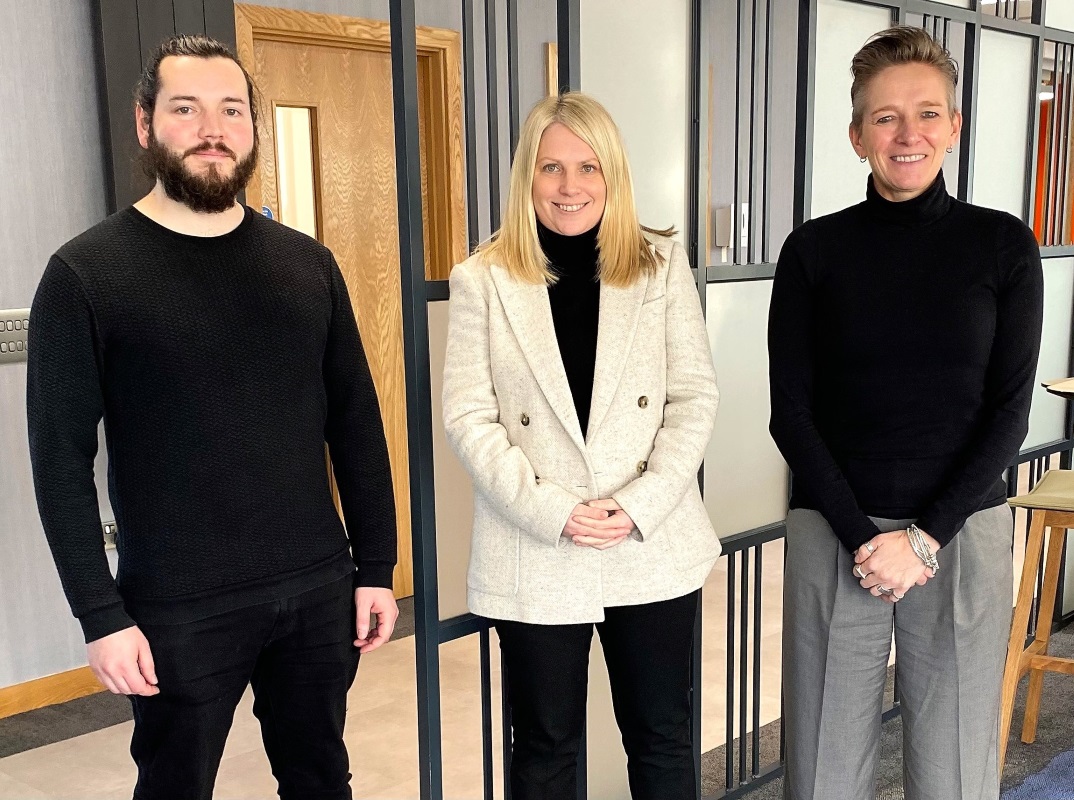Equity with a Capital E: The impact of psychological capital on Equity in HE and employment

This is part three in a series of articles exploring how individual capital impacts employability. You can read our second blog from this series here.
What is Psychological Capital?
Psychological Capital (PsyCap) is a concept rooted in positive psychology, representing an individual’s psychological resources that contribute to success and well-being. It encompasses four key components: hope, the ability to set and pursue meaningful goals; efficacy, confidence in one’s capabilities to achieve objectives; resilience, the capacity to recover from adversity; and optimism, maintaining a positive outlook on future outcomes. Unlike fixed traits, PsyCap is a developable and measurable construct, making it an invaluable asset for personal growth and organisational success in dynamic, high-pressure environments.
In the UK, the importance of PsyCap is increasingly recognised across various sectors. For instance, a study focusing on award-winning educators at a British university found that implementing strengths-based practices can enhance students’ PsyCap, thereby improving their academic well-being and success (PubMed Central).
Furthermore, the UK Government’s Foresight Project on Mental Capital and Wellbeing emphasises the significance of developing psychological resources like resilience and optimism to enhance mental health and productivity. The project estimates that extending recommended treatments for mental health issues, such as depression, to all sufferers could deliver economic benefits well in excess of £1 billion per year (GOV.UK).
Research also indicates that higher levels of PsyCap among employees are associated with improved job performance, job satisfaction, and organisational commitment. This suggests that UK organisations investing in PsyCap development may experience enhanced employee outcomes and overall organisational effectiveness (Cberuk).
In summary, Psychological Capital is a vital, developable resource that significantly contributes to individual and organisational success in the UK. By fostering hope, efficacy, resilience, and optimism, individuals and organisations can enhance well-being, performance, and adaptability in today’s dynamic environments.
How is Psychological Capital Impacted by a Person’s Background?
Psychological Capital (PsyCap) is deeply shaped by an individual’s background, including factors such as education, family influence, social environment, economic resources, and cultural norms:
1. Education:
Access to quality education in the UK significantly enhances psychological capital by fostering self-efficacy and hope. Educational environments that emphasise skill development and goal-setting bolster students’ confidence in their abilities. For instance, the RISE programme, implemented in numerous UK schools, focuses on building children’s emotional resilience and well-being through targeted training and resources (EdPsyched).
Conversely, limited access to education can impede the development of these positive traits. Disadvantaged students often face systemic barriers that hinder their educational progress. Recent data indicates that the gap between university entry rates for disadvantaged students and their peers in England has reached its highest level since 2005, reflecting the increasing impact of socioeconomic disparities on educational attainment (Financial Times).
Despite these challenges, individuals with restricted educational opportunities frequently develop resilience as they navigate and overcome obstacles. Initiatives like sanctuary scholarships for asylum seekers in the UK exemplify how overcoming educational barriers can foster resilience and a sense of belonging within the academic community (Fred Campaign).
In summary, quality education in the UK promotes self-efficacy and hope through skill-building and goal-setting. Some individuals may have limited access to these traits, however, those attempting to overcome educational barriers may cultivate resilience in doing so.
2. Family Influence:
Supportive family environments in the UK play a crucial role in nurturing optimism and self-belief in children through encouragement and positive reinforcement. Conversely, adverse family dynamics can challenge these traits, necessitating the development of resilience in affected individuals.
Research indicates that a significant proportion of UK adolescents experience low self-esteem, with estimates suggesting that between one-third to one-half are affected. Notably, 61% of girls aged 10 to 17 report low self-esteem. These statistics underscore the importance of supportive family structures in fostering self-belief and optimism (They Are The Future).
In challenging family situations, children often develop resilience as a coping mechanism. Studies have shown that family resilience—defined as the family’s ability to adapt and thrive despite adversity—positively influences a child’s subjective well-being, including life satisfaction and emotional health (PubMed Central).
Furthermore, initiatives like the #BeeWell programme in Greater Manchester have observed an increase in hope and optimism among young people, with 83% feeling hopeful about their future in 2023, up from 72% during the height of the COVID-19 pandemic in 2020. Such findings highlight the potential for positive change even in the face of adversity (Anna Freud Centre).
In summary, while supportive family environments in the UK are instrumental in cultivating optimism and self-belief, adverse family dynamics can challenge these traits, prompting individuals to develop resilience to navigate and overcome such challenges.
3. Social Environment:
A positive and inclusive social environment in the UK significantly enhances psychological capital (PsyCap) by reinforcing hope and optimism. Supportive social networks contribute to better mental health outcomes, as individuals with strong social connections often experience increased life satisfaction and emotional well-being (PubMed Central).
Conversely, toxic social environments can undermine these attributes. Research indicates that individuals in adverse social settings may experience heightened stress and reduced mental well-being, potentially diminishing their PsyCap (PubMed Central).
In summary, fostering positive social environments in the UK is crucial for bolstering individuals’ psychological capital, while addressing toxic social dynamics is essential to prevent the erosion of hope and optimism.
4. Economic Resources:
Financial stability in the UK provides individuals with opportunities to build self-efficacy and resilience by granting access to resources and experiences that enhance confidence. For instance, financial confidence correlates strongly with higher net worth; confident individuals average a net worth of £145,000 compared to £78,000 for those less confident (The Sun).
Conversely, financial scarcity can challenge these attributes. The concept of ‘money dysmorphia’ – where high earners perceive themselves as ‘poor’ – illustrates how financial anxiety can undermine self-efficacy and optimism. This condition, though not officially recognised, manifests as distorted concerns about finances, leading to significant life decisions being adversely affected (Financial Times).
However, scarcity may also foster resilience in some individuals. Research suggests that social connectedness serves as a resilience resource in the UK, helping individuals cope with difficult financial circumstances. This resilience is not entirely explained by emotional support, indicating that other factors, such as community networks, play a role in mitigating the effects of financial hardship (SpringerLink).
In summary, while financial stability in the UK facilitates the development of self-efficacy and resilience through access to confidence-enhancing resources, financial scarcity can challenge these traits but may also build resilience, particularly when bolstered by strong social connections.
5. Cultural Norms:
Cultural norms in the UK significantly influence the development of psychological capital (PsyCap), with individualistic and collectivist values shaping distinct attributes. Individualistic cultures, which emphasise personal autonomy and self-reliance, often prioritise self-efficacy and optimism. In contrast, collectivist cultures, focusing on group cohesion and interdependence, tend to emphasise resilience and support networks.
Research indicates that individuals from individualistic societies are more likely to conform to emotional norms, expressing emotions in ways that align with societal expectations. This conformity can enhance self-efficacy and optimism, as individuals navigate social interactions with confidence (British Psychological Society).
Conversely, collectivist cultures place a higher value on social harmony and interconnectedness, fostering resilience through strong support networks. The emphasis on group well-being encourages individuals to develop coping mechanisms that benefit the collective, thereby enhancing communal resilience (Wikipedia).
In the UK, a multicultural society with both individualistic and collectivist influences, these cultural norms interact to shape PsyCap development. Understanding the balance between individual autonomy and collective responsibility is essential for fostering psychological well-being across diverse communities.
In summary, cultural norms in the UK play a pivotal role in shaping psychological capital, with individualistic values promoting self-efficacy and optimism, and collectivist values emphasising resilience and support networks.
How Does Cultural Capital Impact Equity?
Psychological Capital (PsyCap), encompassing hope, self-efficacy, resilience, and optimism, plays a pivotal role in influencing equity within various sectors of UK society. By fostering these positive psychological resources, individuals and organisations can address disparities and promote inclusivity.
PsyCap and Social Class
Building upon the understanding that Psychological Capital (PsyCap) intersects with social, economic, and cultural capital, it’s essential to explore how disparities in PsyCap contribute to social inequalities within the UK.
Research indicates that PsyCap is unequally distributed among individuals from different social classes, ethnic backgrounds, and genders. This unequal distribution suggests that those from higher social classes may possess greater levels of PsyCap, potentially perpetuating existing social inequalities (IAAP Journals).
Educational attainment is both influenced by and influences PsyCap. Students from disadvantaged backgrounds may have lower levels of PsyCap, affecting their academic performance and limiting access to higher education opportunities. Conversely, educational environments that support the development of PsyCap can help mitigate these disparities (PubMed Central).
In the UK, disparities in PsyCap can influence employment opportunities and career progression. Individuals from lower social classes may face challenges in developing PsyCap components such as self-efficacy and resilience, which are critical for navigating the job market and advancing in their careers. This can contribute to the persistence of the “class ceiling” in professional environments (Financial Times).
Addressing the unequal distribution of PsyCap requires targeted interventions aimed at enhancing these psychological resources among disadvantaged groups. Policies that promote mental health, provide access to supportive educational environments, and create equitable employment opportunities are essential steps toward reducing social inequalities in the UK (GOV.UK Assets).
Therefore, the unequal distribution of Psychological Capital contributes to the perpetuation of social inequalities in the UK. Addressing these disparities through targeted interventions is crucial for promoting social equity and improving mental health outcomes across diverse populations.
Educational Initiatives and PsyCap
Educational programs in the UK that focus on developing components of Psychological Capital (PsyCap), such as resilience and self-efficacy, have been implemented to address educational disparities. These initiatives aim to equip students from diverse backgrounds with the psychological resources necessary to succeed academically and beyond.
Research indicates that students with higher levels of PsyCap tend to achieve better academic outcomes. A study found that PsyCap plays a key role in academic performance, engagement, and intrinsic motivation among university students (PubMed Central).
Recommendations:
Educational interventions designed to enhance PsyCap have shown promising results. For instance, programmes that focus on building self-efficacy and resilience can lead to improved academic success and reduced procrastination among students (Taylor & Francis Online).
By fostering PsyCap, educational programmes can help mitigate the effects of socioeconomic disparities. Students from disadvantaged backgrounds who develop higher levels of PsyCap are better equipped to overcome challenges and achieve academic success (SPSSI Online Library).
Implementing educational programmes that enhance PsyCap components like resilience and self-efficacy is a strategic approach to addressing educational disparities in the UK. By equipping students with these psychological resources, such initiatives promote academic success and contribute to greater educational equity.
Recommendation: Integrate PsyCap Development into Educational Curricula
Goal: Foster equity in HE by equipping students, particularly those from disadvantaged backgrounds, with the psychological resources to succeed.
Strategies:
- Resilience Training Modules: Introduce resilience-building workshops within secondary and higher education curricula, emphasising coping strategies for academic and personal challenges.
- Self-Efficacy through Experiential Learning: Expand opportunities for practical, hands-on learning experiences that empower students to apply their skills and see the tangible impact of their efforts. Examples include internships, collaborative projects, and real-world simulations.
- Culturally Responsive Teaching: Tailor programmes to address diverse cultural and socioeconomic contexts, helping students connect academic success with personal identity and community growth.
- Supporting Evidence: Research from the UK’s Foresight Project on Mental Capital and Wellbeing highlights the economic and social benefits of resilience training, estimating significant national cost savings from improved mental health and productivity (GOV.UK).
Employment Experiences
Studies have demonstrated a significant positive relationship between PsyCap and employee performance. Employees exhibiting higher levels of PsyCap tend to engage more effectively with their tasks, leading to improved performance outcomes (SAGE Journals).
Enhanced PsyCap is associated with reduced absenteeism and lower levels of workplace cynicism. Employees with higher PsyCap are more likely to maintain consistent attendance and exhibit a positive attitude towards their work and organisation (Super Wellness).
Importantly, PsyCap is a developable resource. Organisations can implement training and development programmes aimed at enhancing employees’ PsyCap, leading to sustained improvements in well-being and performance (Wikipedia).
Recommendations:
In the UK, prioritising the development of employees’ PsyCap can address prevalent workplace challenges, including stress and mental health concerns. By fostering a supportive environment that enhances PsyCap, organisations can improve employee satisfaction, reduce turnover, and boost overall productivity.
Therefore, integrating Psychological Capital into workplace practices offers a strategic advantage for organisations aiming to enhance employee well-being and performance. By investing in the development of PsyCap, UK employers can cultivate a more resilient, optimistic, and high-performing workforce.
Recommendation: Develop PsyCap-Focused Employability Programmes
Goal: Bridge employment equity gaps by enhancing employees and job seekers’ PsyCap, particularly for underrepresented groups.
Strategies:
- PsyCap Assessment Tools: Incorporate PsyCap evaluation into recruitment and employability services, enabling job seekers to identify areas for growth in hope, efficacy, resilience, and optimism.
- Career Development Interventions: Develop tailored mentorship and coaching programs aimed at boosting PsyCap. For instance, resilience coaching for individuals re-entering the workforce after career breaks or redundancy.
- Strengths-Based Recruitment: Shift focus from traditional CV-based hiring to identifying candidates’ PsyCap traits, promoting inclusivity and a degree-agnostic approach.
- Supporting Evidence: Enhanced PsyCap correlates with higher job performance, job satisfaction, and organisational commitment (Transitioning Well). Programmes like this can simultaneously enhance equity and organisational outcomes.
Gender Equity and PsyCap
Building upon the understanding that initiatives aimed at promoting gender equality can enhance women’s Psychological Capital (PsyCap) in the UK, several campaigns and policies have been instrumental in this regard.
Enhancing women’s PsyCap through initiatives has broader implications for economic empowerment. A report by the UK government emphasises that addressing factors like body image and self-esteem is crucial for women’s economic participation and empowerment (GOV.UK Assets).
Improving women’s PsyCap has positive effects on their educational and workplace experiences. By fostering traits like self-efficacy and resilience, women are better equipped to pursue educational opportunities and navigate professional environments, contributing to greater gender equity in these domains.
Efforts to address women’s imposter syndrome in the workplace are becoming increasingly prevalent as organizations recognize the importance of psychological capital (PsyCap) — a construct comprising hope, efficacy, resilience, and optimism — in driving employee well-being and performance. Targeted initiatives have been designed to both reduce the prevalence of imposter syndrome and boost women’s PsyCap, fostering a more supportive and empowering environment.
Recognising that women’s experiences with imposter syndrome may be influenced by intersecting identities, some initiatives address unique barriers faced by women of colour, LGBTQ+ women, and women with disabilities. Tailored programmes ensure inclusivity, further enhancing the psychological capital of diverse groups by fostering hope, resilience, and empowerment across varied contexts.
Integrating Psychological Capital (PsyCap) into workplace practices has been shown to significantly enhance employee well-being and performance. PsyCap, comprising hope, efficacy, resilience, and optimism, serves as a valuable resource for employees navigating the challenges of modern work environments.
Recommendations:
Recommendation: Implement PsyCap Development Programmes Targeted at Women
Goal: Equip women with the psychological resources needed to overcome systemic barriers and succeed across personal and professional domains.
Strategies:
- Confidence-Building Workshops: Design programmes aimed at enhancing self-efficacy by addressing specific challenges faced by women, such as imposter syndrome and societal expectations.
- Resilience Training: Provide structured training focused on coping strategies for gender-based workplace discrimination, pay gaps, and other inequities.
- Leadership Development: Create opportunities for women to develop leadership skills and foster optimism by showcasing role models who have successfully navigated similar challenges.
- Equity Audits: Regularly review workplace practices to ensure women have equal access to leadership opportunities, training, and promotions, fostering their hope and self-efficacy.
- Flexible Work Arrangements: Support women in balancing career and caregiving responsibilities, allowing them to build resilience and optimism without compromising career growth.
- Anti-Bias Training: Train managers and leaders to recognise and counteract gender bias, fostering an inclusive environment where women’s PsyCap can thrive.
- Supporting Evidence: Research demonstrates that interventions like confidence coaching and resilience training significantly enhance women’s self-efficacy and overall PsyCap (Deloitte). Workplaces that promote equity and flexibility report higher levels of employee satisfaction, productivity, and reduced turnover among women (Kman Publications Journals).
Recommendations aimed at addressing PsyCap and Inequity:
1. Address Equity in PsyCap Distribution via Policy and Community Interventions
Goal: Tackle systemic inequities that hinder PsyCap development for marginalised communities.
Strategies:
- Community-Based PsyCap Programs: Partner with local organisations to deliver accessible PsyCap development workshops in underserved areas. For instance, resilience and optimism training tailored to young people from economically disadvantaged backgrounds.
- Policy Advocacy: Advocate for national strategies that integrate PsyCap into social equity policies, such as expanding access to mental health resources or supporting financial literacy programs that enhance self-efficacy.
- Digital Accessibility: Develop online tools and mobile apps to make PsyCap resources widely available, overcoming barriers like geographic isolation or mobility challenges.
- Supporting Evidence: Digital interventions have shown promise in delivering mental health and resilience training at scale, as evidenced by initiatives like the #BeeWell programme in Greater Manchester (Anna Freud Centre).
2. Promote PsyCap Research and Data-Driven Strategies
Goal: Strengthen the evidence base for PsyCap’s role in promoting equity, driving targeted interventions in HE and employment.
Strategies:
- Longitudinal Studies: Conduct research on how PsyCap development influences long-term equity outcomes in education and employment, with a focus on underrepresented populations.
- Sector-Specific Data Analysis: Partner with industry and academic institutions to analyse PsyCap’s impact within specific sectors, such as STEM or creative industries, where diversity gaps persist.
- Impact Assessments: Evaluate the effectiveness of PsyCap-based initiatives to refine strategies and ensure resources are directed where they are most needed.
- Supporting Evidence: Targeted research and pilot projects can inform scalable, evidence-based solutions for closing equity gaps in the UK.
Conclusion
Enhancing Psychological Capital (PsyCap) across various sectors in the UK holds significant potential for promoting equity. By focusing on the development of hope, self-efficacy, resilience, and optimism, it is possible to address social disparities and foster a more inclusive society. These components of PsyCap not only empower individuals but also help to dismantle systemic barriers that perpetuate inequality. For instance, cultivating hope can provide underserved communities with a vision for a better future, while self-efficacy equips them with the confidence to pursue meaningful opportunities.
Resilience plays a crucial role in enabling individuals to navigate challenges and bounce back from adversity, which is particularly important in addressing the disadvantages faced by marginalised groups. Similarly, fostering optimism can create a positive outlook, encouraging collective action and societal collaboration to tackle deep-seated inequities.
The implementation of PsyCap initiatives should be tailored to specific sectors—such as education, healthcare, and employment—to maximise their impact. In education, integrating PsyCap principles can bridge achievement gaps and create environments where all students thrive. In healthcare, fostering resilience and optimism among patients and providers can improve outcomes and reduce disparities. Within the workforce, enhancing self-efficacy and resilience can empower underrepresented employees to advance and contribute fully to their organisations.
Ultimately, a strategic, cross-sectoral approach to building Psychological Capital has the potential to transform individual lives and societal structures, driving progress toward a more equitable and inclusive future for the UK.
By Sorrel Knott, Research Executive at GotDis













Responses